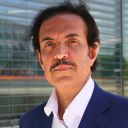Professor Nayef Al-Rodhan is a Philosopher, Neuroscientist and Geostrategist. He is Head of GCSP's Geopolitics and Global Futures Programme and Honorary Fellow of St. Antony's College at Oxford University, Oxford, United Kingdom. He was voted as one of the Top 30 most influential Neuroscientists in the world.
He holds an M.D. and a Ph.D. He trained in neurosurgery/neuroscience research at the Mayo Clinic, Yale University and Harvard University.
He founded the neurotechnology programme, headed translational research and founded the laboratory for cellular neurosurgery and neurosurgical technology at MGH, Harvard. He was on the faculty of the Harvard Medical School, has published extensively on neuroscience research and won several research prizes. These prizes include: The Sir James Spence Prize; The Gibb Prize; The Farquhar-Murray Prize; The American Association of Neurological Surgeon Poster Prize (twice); The Meninger Prize; The Annual Resident Prize of the Congress of Neurological Surgeons; The Young Investigator Prize of the American Association of Neurological Surgeons; The Annual Fellowship Prize of the Congress of Neurological Surgeons.
His interests include: Geostrategy and Sustainable National and Global Security; The Role of Science, Aerospace and Strategic Technologies in Geopolitics and Human Destiny; Global Strategic Cascading Risks; Global Justice, Human Dignity and Transcultural Synergy; Philosophy of Good Governance, Philosophy of Human Nature, Philosophy of History and Collective Civilisational Triumph; the History of Ideas; the Neurochemical and Cellular Foundations and Predilections of Human Nature and Their Implications for Global Discourses and Moral and Political Cooperation.






